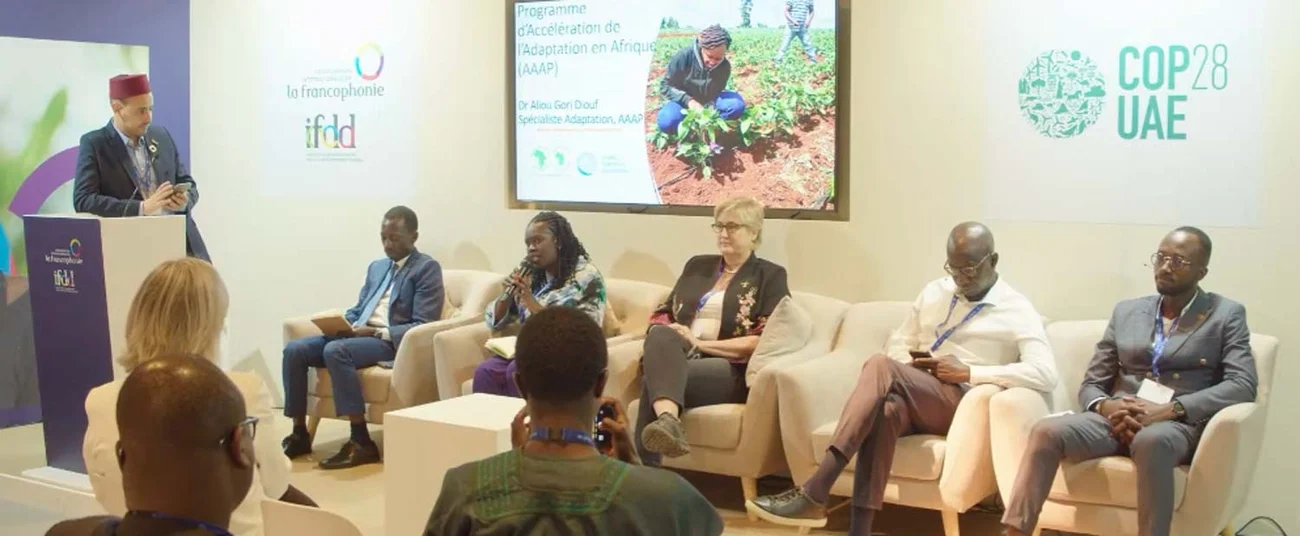At COP28, the Africa Adaptation Acceleration Program (AAAP) – a joint initiative of the African Development Bank (AfDB) and the Global Center on Adaptation (GCA) – and the Institut de la Francophonie pour le Développement Durable (IFDD), hosted a side event focused on amplifying the voices of young people. The event aimed to delve into the role that youth can play in mitigating the challenges posed by climate change, particularly in French-speaking Africa. The session aimed to ensure equal engagement and information dissemination to the French-speaking community about the benefits of the AAAP climate adaptation program.
Dr. Alhamndou Dorsouma, Manager of the Bank’s Climate Change and Green Growth Department, underscored the pivotal role of youth-led entrepreneurship in promoting climate adaptation in Africa. He highlighted the early success of AAAP in supporting climate solutions developed by young entrepreneurs, under the YouthADAPT pillar
The YouthADAPT Program is one of the four core pillars of the AAAP which aims to strengthen the production of youth-led or owned small to medium sized enterprises to increase climate resilience and boost job opportunities.
“The YouthADAPT program under AAAP has allocated over $5 million to support 33 young entrepreneurs across 19 African countries, showcasing the essential role of youth in this transformation,” said Dorsouma.
Collective Efforts
Dr. Oluyede Ajayi of the GCA emphasized the need for collective efforts to address challenges quantitatively and regionally. He pointed out the disparity in awareness of adaptation programs between English and French speakers and emphasized the need to close this gap.
Caroline St Hilaire, Administrator of the Organisation Internationale de La Francophonie (OIF), stressed the critical role of youth in shaping the future.
“It’s crucial to recognize that youth will bear the consequences of our collective decisions, and it’s their innovation and know-how that will shape the future,” she said.
She outlined OIF’s commitment to fostering innovation and expertise among young people by empowering over 1200 youth in climate-related businesses. The organization focuses on forging partnerships tailored to the needs of French-speaking youth, facilitating access to financing through collaborations with institutions such as the African Development Bank.
Panel Discussion
The event featured a panel discussion. Participants highlighted both opportunities and challenges in empowering young people and women in French-speaking countries to take decisive action on climate change.
Amath Pathé Sene, Managing Director of Africa Food Systems Forum (AGRF), shed light on the struggles faced by those affected by climate change, particularly in agricultural systems.
“We are aware of the challenges faced by those driven to migration due to the impacts of climate change on their food production systems—whether in fishing, agriculture, or livestock,” Sene said.
He emphasized the need to create a global forum to focus on agriculture and food systems, collaborating with young people to introduce practical solutions.
Jacqueline Randabel Sauzier, Secretary General of the Mauritius Chamber of Agriculture, emphasized the urgent need to attract youth to agriculture. She highlighted initiatives such as open days for farmers and students to encourage youth participation in agriculture.
Issa Bado, a program specialist with IFDD, outlined its efforts to engage and empower young entrepreneurs in impactful climate adaptation projects within French-speaking countries.
“When discussing adaptation action today, we’re dealing with a context dominated by a specific group—the negotiators, public administrations—controlling climate-related themes,” Bado said.
Angoua Romarik Kouadio, livestock engineer and green entrepreneur, emphasized the challenges entrepreneurs face in accessing information and securing funding in French-speaking countries. He urged the amplification of education on climate change adaptation, especially within French-speaking communities.
Pelkins Ajanoh, owner of CassVita, a social enterprise in Cameroon that leverages technology to eradicate food insecurity and create prosperity for smallholder farmers in Africa, also participated. A previous YouthADAPT competition winner, he highlighted the challenges Francophone-based entrepreneurs face. These include limited funding opportunities and complexities in navigating business launch procedures.
“One of our primary hurdles is accessing funding. Most financial resources are often directed to English-speaking countries, creating a disparity in support. Additionally, navigating business launch procedures in French-speaking Africa poses unique challenges compared to those in English-speaking countries,” said Ajanoh.
Many investors are well-versed in countries like Nigeria or South Africa but lack knowledge about the regulations and processes governing entrepreneurship in our region, Ajanoh added.
Panelists expressed consensus on the urgent need for collaboration and put forward several recommendations. These included fostering synergy among stakeholders and calling for to efforts to support young entrepreneurs and enable networking via digital platforms.
This post was originally published by the African Development Bank Group.


